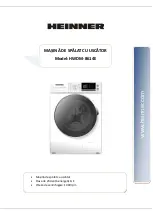
18
Installation Instructions
GAS REQUIREMENTS
WARNING
•
Installation must conform to local codes and
ordinances, or in their absence, the NATIONAL
FUEL GAS CODE, ANSI Z223.
•
This gas dryer is equipped with a Valve and
Burner Assembly for use only with natural gas.
Using conversion kit WE25X10014, your local
service organization can convert this dryer for
use with propane (LP) gas. ALL CONVERSIONS
MUST BE MADE BY PROPERLY TRAINED AND
QUALIFIED PERSONNEL AND IN ACCORDANCE
WITH LOCAL CODES AND ORDINANCE
REQUIREMENTS.
•
The dryer must be disconnected from the gas
supply piping system during any pressure testing
of that system at a test pressure in excess of
0.5 PSI (3.4 KPa).
•
The dryer must be isolated from the gas supply
piping system by closing the equipment shut-off
valve during any pressure testing of the gas
supply piping of test pressure equal to or less
than 0.5 PSI (3.4KPa).
DRYER GAS SUPPLY CONNECTION
3/8
”
NPT MALE THREAD GAS SUPPLY
NOTE:
Add to vertical dimension
the distance between cabinet
bottom to floor.
GAS SUPPLY
•
A 1/8” National Pipe Taper thread plugged
tapping, accessible for test gauge connection,
must be installed immediately upstream of the
gas supply connection to the dryer. Contact your
local gas utility should you have questions on the
installation of the plugged tapping.
•
Supply line is to be 1/2
”
rigid pipe and equipped
with an accessible shutoff within 6 feet of, and in
the same room with, the dryer.
•
Use pipe compound appropriate for natural or LP
gas or use Teflon
®
tape.
•
Connect flexible metal connector to dryer and
gas supply.
IN THE COMMONWEALTH
OF MASSACHUSETTS
•
This product must be installed by a licensed
plumber or gas fitter.
•
When using ball-type gas shut-off valves, they
shall be the T-handle type.
•
A flexible gas connector, when used, must not
exceed 3 feet.
CONNECTING A GAS DRYER (cont.)
2
3
⁄
8
”
(6 cm)
3
1
⁄
4
”
(8.2 cm)
ADJUSTING FOR ELEVATION
•
Gas clothes dryers input ratings are based on
sea level operation and need not be adjusted
for operation at or below 2000 ft. elevation.
For operation at elevations above 2000 ft., input
ratings should be reduced at a rate of 4 percent
for each 1000 ft. above sea level.
•
Installation must conform to local codes and
ordinances or, in their absence, the NATIONAL
FUEL GAS CODE, ANSI Z223.
















































